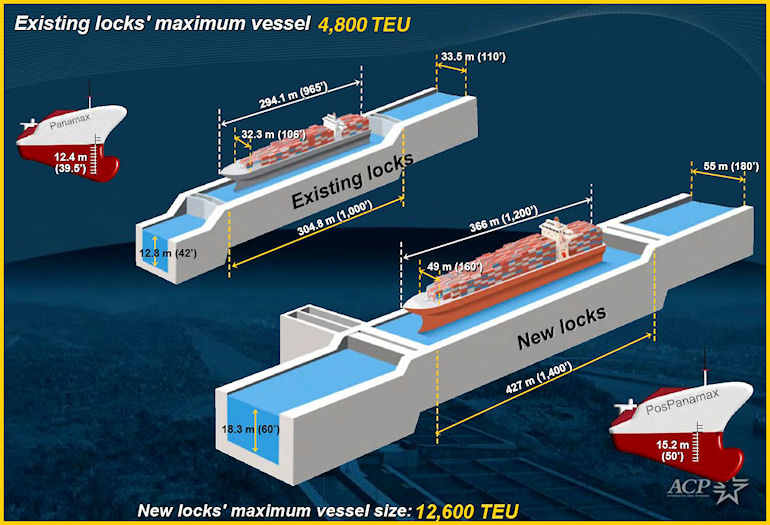Passage expected before end of the week to help improve locks, dams and ports.

House Energy & Commerce Committee chairman Fred Upton (R., Mich.), House Transportation & Infrastructure Committee chairman Bill Shuster (R., Pa.), Senate Environment & Public Works Committee chairman Jim Inhofe (R., Okla.) and House Natural Resources Committee chairman Rob Bishop (R., Utah) announced an agreement on comprehensive water resources infrastructure legislation.

Each year, approximately 600 million bushels of U.S. soybeans transit the Panama Canal – the number one agricultural commodity utilizing this critical link in the logistics chain.
The legislation, the “Water Infrastructure Improvements for the Nation (WIIN) Act,” includes the Water Resources Development Act (WRDA), which authorizes port, waterway and flood protection improvements for the country. The WIIN Act also includes the Water & Waste Act of 2016 to help communities meet the requirements of the Safe Drinking Water Act and to authorize state regulation of coal ash. In addition, the legislation addresses significant tribal and natural resources issues.
The House and Senate both overwhelmingly passed WRDA bills earlier this year, and the WIIN Act is the product of the subsequent bicameral negotiations.
“The WIIN Act is the result of hard work and collaboration among our committees and will strengthen the nation’s transportation and water infrastructure and our economic competiveness. We look forward to moving this legislation and sending it to the President before the end of the year,” the committee chairmen said in a joint statement.
The bill restores certainty to the WRDA process and returns to a two-year cycle of Congress considering WRDA legislation.
For example, the expanded Panama Canal opened in June 2016 with the capacity to accommodate larger vessels that can carry nearly three times as many shipping containers. However, fewer than 10 of America’s ports are currently capable of handling these fully loaded modern container ships.
WRDA invests in America to prepare for this growth and to help the U.S. compete globally with 21st-century infrastructure. WRDA 2016 follows the strong bipartisan reforms included in the Water Resources Reform & Development Act of 2014 and adheres to the process Congress established in the 2014 law for oversight, review and consideration of proposed water resources development activities of the Army Corps of Engineers.
Mike Steenhoek, executive director of the Soy Transportation Coalition said, "In the midst of a very contentious and acrimonious election year, we are pleased that one piece of legislation that is progressing through Congress is a Water Resources Development Act. This demonstrates that productive work can still be achieved in a bipartisan manner. American farmers depend on a well-maintained system of locks and dams and ports to compete effectively in the international marketplace. We are hopeful that Congress will pass this bill without delay and that President (Barack) Obama will sign it into law before the end of the calendar year."
A national poll released by the Association of Equipment Manufacturers (AEM) found that voters strongly support federal funding for water pipelines and waterways as well as for resources that prevent drinking water contamination crises, such as what occurred in Flint, Mich.
The findings were part of a national poll commissioned by AEM to gauge voter perceptions and attitudes about U.S. water infrastructure broadly and WRDA 2016 specifically.
“Improving and modernizing U.S. infrastructure overall and, in this case, water infrastructure continue to be a bipartisan priority among voters,” Dennis Slater, AEM president, said. “Congressional leaders in both the U.S. Senate and House are to be commended for taking action on their respective versions of a 2016 WRDA bill but should reach consensus on a final version before the 114th Congress adjourns.”
The national poll identified a number of key findings, including:
A majority (54%) of registered voters say that U.S. water infrastructure is in fair or poor condition.
Nearly seven out of 10 (67%) of the surveyed population believe that the federal government should spend somewhat more or much more on water pipelines and waterways.
More than seven out of every 10 (74%) registered voters either support or strongly support Congress passing WRDA.
A clear majority (73%) of registered voters are either somewhat or much more likely to support WRDA when they learn that it might prevent drinking water crises such as the one in Flint.
The national poll was conducted as part of AEM’s ongoing efforts to develop a long-term national vision for U.S. infrastructure through its Infrastructure Vision 2050 initiative. An analysis of the poll results is available here.
About the Author(s)
You May Also Like





